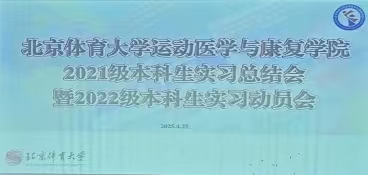
2025年4月25日,北京体育大学运动医学与康复学院在卓越报告厅成功举办“2021级本科生实习总结会暨2022级本科生实习动员会”。会议由学院分党委书记戴旭主持,学院领导、实习合作单位专家、专业教师及全体本科生参会,通过经验分享与政策解读,为即将踏上实习征程的学子指明方向。
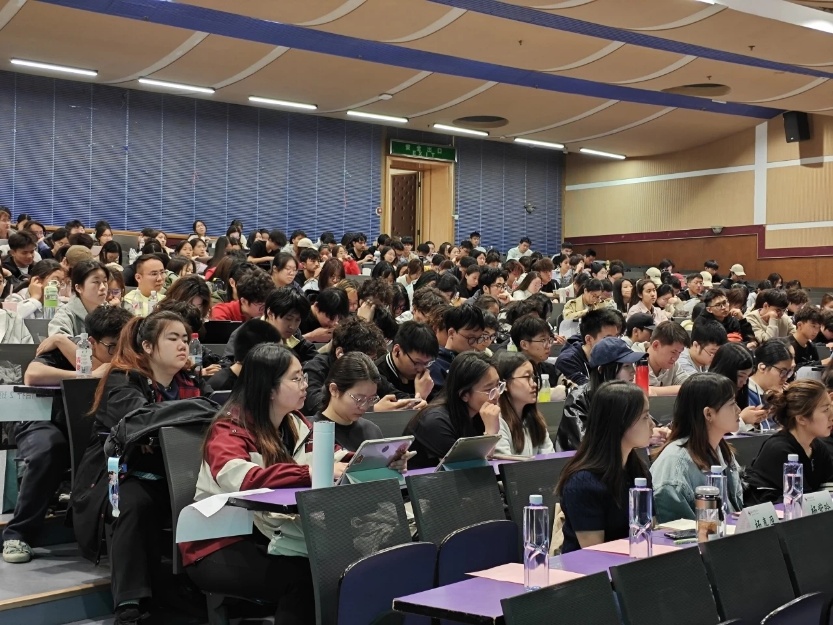
会议伊始,学院分党委副书记、副院长钱菁华教授以“实习是医者成长的必由之路”为主题,结合28年前的亲身经历,强调实习对专业能力提升的重要性。她指出,实习基地的丰富资源为学生提供了理论与实践结合的宝贵机会,并叮嘱学生做好知识储备与心态调整,以主动学习的态度迎接挑战。
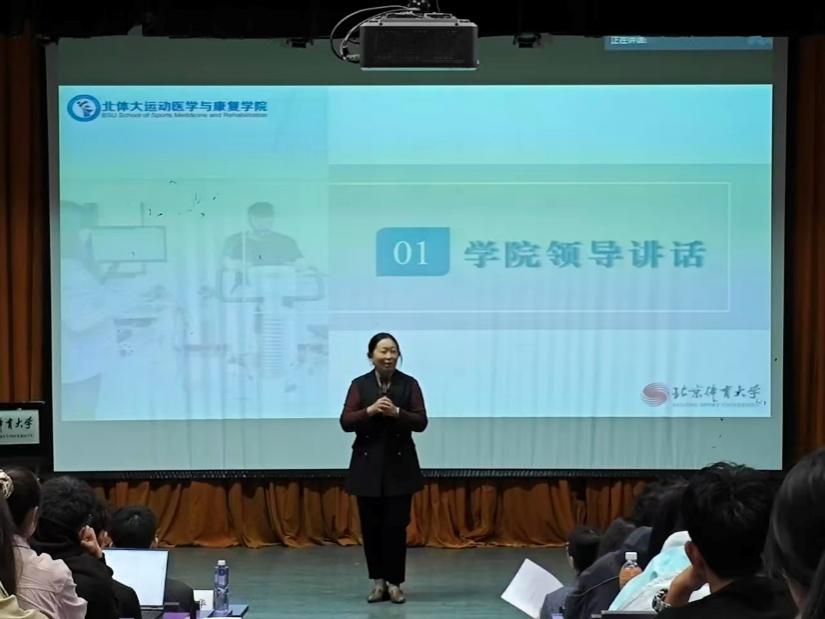
实习单位:来自全国顶尖医疗机构的实习单位代表详细介绍了培养计划与特色方向:中国康复研究中心乔柯娇、马婷婷老师表示,作为中康作为全国唯一一家三个康复治疗专业均通过国际认证的机构,提供36周临床轮转的实习机会,实习内容涵盖儿童与青少年运动功能障碍、肌肉骨骼损伤、神经与心肺物理治疗等多个核心领域。
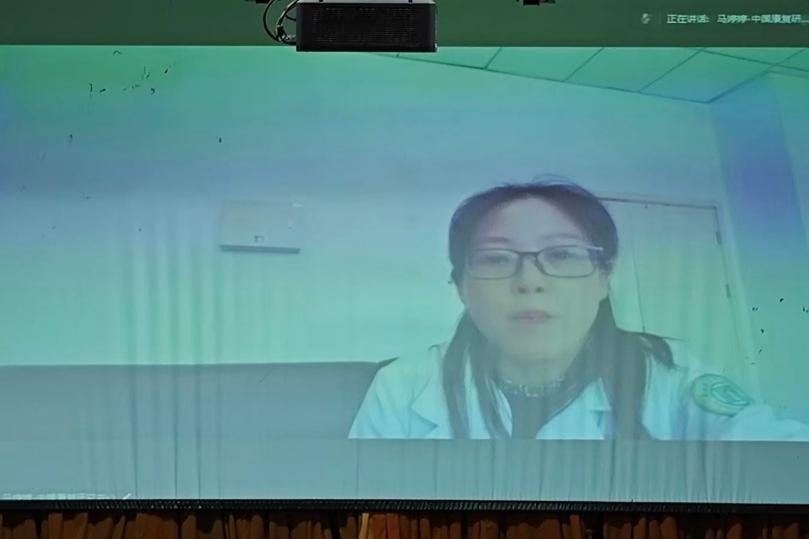
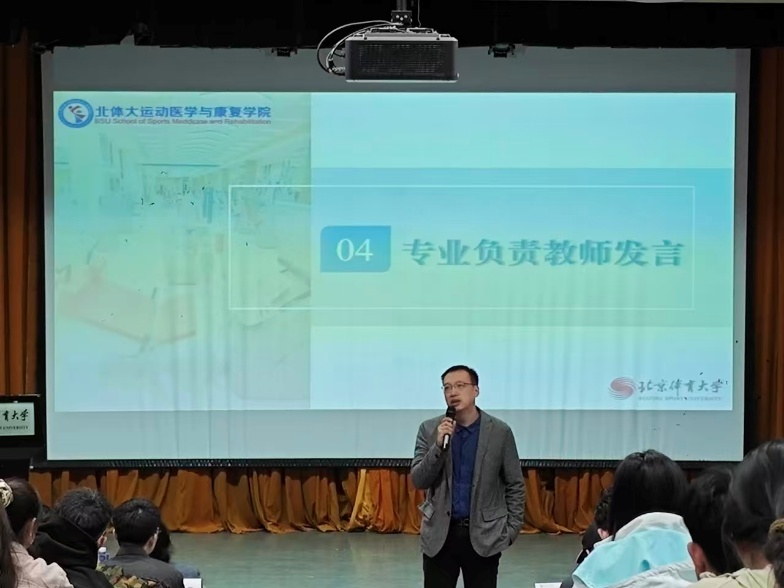
专业指导:运动康复教研室主任、运动康复专业实习负责教师张恩铭与运动医学教研室教师、康复物理治疗专业负责人朱悦彤分别从实习任务与职业规范角度提出要求。张恩铭老师着重强调“沟通能力与专业技能并重”,提醒学生珍惜临床资源,主动与带教老师、患者沟通互动,提升专业技能和职业素养。朱悦彤老师在动员会上着重强调实习期间的职业规范与综合素养,明确实习期间需严守规章制度,注重团队协作与安全意识,以“职业素养+专业表现”展现北体学子风采。
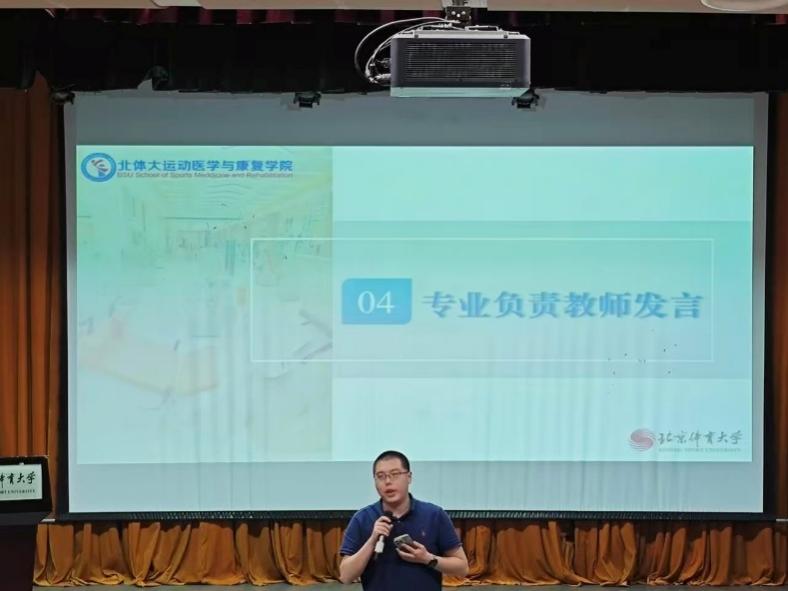
学长学姐分享:2021级优秀实习生代表结合实习经历,为学弟学妹提供“参考答案”。在中国康复研究中心北京博爱医院实习的胡宜辰同学分享了她的实习经历。她详细介绍了实习地点、内容、考核方式以及注意事项。胡宜辰强调,实习期间,实习生需要不断提升手法技术、与其他治疗师协作,并掌握不同治疗方式及器械的使用方法。此外,医院还提供了丰富的学习机会,在中国康复研究中心多科室轮转学习中通过小讲课与实操全面提升技能。
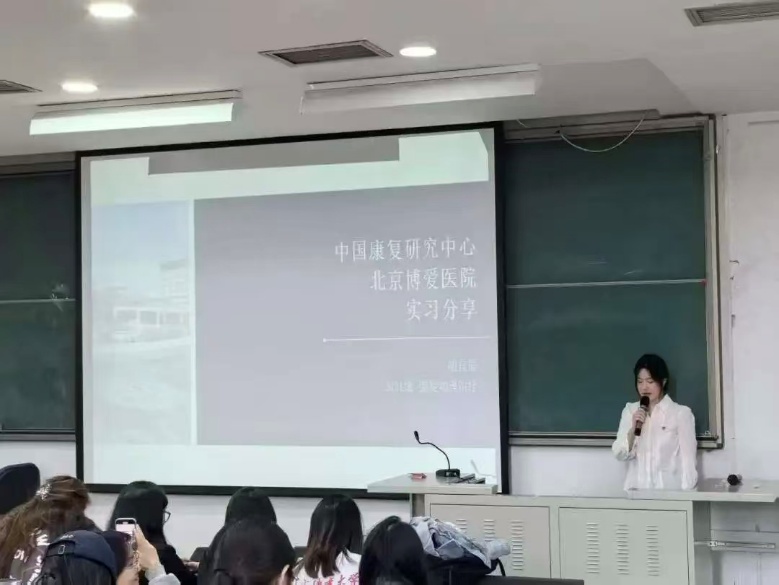
互动答疑:会议最后,2022级学生就岗位选择、考核标准等问题与在场教师深入交流。与会嘉宾结合医院需求与学院规范,逐一解答,为学子扫清实践疑虑。
英文:
On April 25, 2025, the School of Sports Medicine and Rehabilitation at Beijing Sport University successfully held the "2021 Undergraduate Internship Summary Meeting and 2022 Undergraduate Internship Mobilization Meeting" in the Excellence Lecture Hall. The meeting was presided over by Dai Xu, Secretary of the School's Party Committee. School leaders, experts from internship partner institutions, professional teachers, and all undergraduate students attended the event. Through experience sharing and policy interpretation, the meeting provided guidance for students about to embark on their internships.
At the beginning of the meeting, Professor Qian Jinghua, Deputy Secretary of the School's Party Committee and Vice Dean, delivered a speech titled "Internship: An Essential Path for Medical Professionals' Growth." Drawing on her personal experiences from 28 years ago, she emphasized the importance of internships in enhancing professional capabilities. She pointed out that the abundant resources at internship bases offer valuable opportunities for integrating theory with practice. She also advised students to prepare both academically and mentally, encouraging them to embrace challenges with a proactive learning attitude.
Internship Institutions: Representatives from top-tier medical institutions across the country detailed their training programs and specialized focuses. Qiao Kejiao and Ma Tingting from the China Rehabilitation Research Center (CRRC) noted that, as the only institution in China with all three rehabilitation therapy programs internationally accredited, CRRC offers a 36-week clinical rotation internship. The internship covers core areas such as motor dysfunction in children and adolescents, musculoskeletal injuries, and neurological and cardiopulmonary physical therapy.
Professional Guidance: Zhang Enming, Director of the Sports Rehabilitation Teaching and Research Office and internship coordinator for the Sports Rehabilitation program, and Zhu Yuetong, faculty member of the Sports Medicine Teaching and Research Office and program coordinator for the Rehabilitation Physical Therapy program, outlined requirements regarding internship tasks and professional standards. Zhang Enming emphasized the equal importance of "communication skills and professional expertise," urging students to cherish clinical resources, actively engage with mentors and patients, and enhance both their technical skills and professional conduct. Zhu Yuetong stressed the importance of professional norms and comprehensive competence during internships. She clarified that students must strictly adhere to regulations, prioritize teamwork and safety awareness, and demonstrate the caliber of Beijing Sport University students through "professionalism + exemplary performance."
Sharing by Seniors: Outstanding interns from the Class of 2021 shared their experiences to provide "reference answers" for their juniors. Hu Yichen, who interned at Beijing Bo'ai Hospital of the China Rehabilitation Research Center, shared her internship journey. She detailed the internship locations, content, assessment methods, and key considerations. Hu Yichen highlighted that during the internship, students need to continuously improve their manual skills, collaborate with other therapists, and master the use of various treatment methods and equipment. Additionally, the hospital offers abundant learning opportunities, with skill development enhanced through small lectures and hands-on practice during rotations across multiple departments at the China Rehabilitation Research Center.
Q&A Session: At the end of the meeting, students from the Class of 2022 engaged in in-depth discussions with attending teachers on topics such as position selection and assessment standards. The guests addressed students' queries one by one, aligning hospital requirements with school standards, thereby clearing up uncertainties about the practical training.
附:实习医院介绍:
中文:
中国康复研究中心是集康复医疗、康复科学技术研究、康复人才培养、康复信息服务、康复工程研究以及社会服务指导于一体的综合性康复机构和技术资源中心。中国康复研究中心附属北京博爱医院是我国唯一一家三级甲等康复专科医院。
中国康复研究中心(北京博爱医院)成立于1988年 10月,是直属于中国残联的全民所有制事业单位和我国一家以康复为特色的三级甲等综合公立医院,主要承担着我国康复医疗、康复研究、人才培养、社区指导、国际交流等多领域康复工作。经过30余年的探索与发展,中国康复研究中心(北京博爱医院)已经成为集康复医疗、教育、科研、工程、信息、社会服务于一体的大型现代化综合性康复机构,拥有职工1700余人,占地220余亩,建筑面积12万平方米,设置门急诊、康复临床、综合临床、康复治疗、医技等52个科室,并设有残疾预防与控制研究中心、国家孤独症康复研究中心、国家药物临床试验机构、神经损伤与康复北京市重点实验室等,开放床位1100张。中国康复研究中心(北京博爱医院)是我国现代康复医学发展史上的一座里程碑,也是我国康复事业的一颗明珠。
中国康复研究中心(北京博爱医院)作为医疗保险(A类)与工伤保险定点医院,具有规模大、康复手段齐全、康复流程完善、康复模式先进、康复专家众多、康复技术创新能力突出等优势,形成了覆盖残疾预防、急性期救治、早期干预、中后期康复、职业康复和社区家庭更生等内容的中国特色全面康复服务模式。中国康复研究中心(北京博爱医院)拥有神经康复、脊髓损伤康复、儿童康复、骨与骨关节康复、神经泌尿康复、心肺康复和传统医学康复等多个优势专业学科。中国康复研究中心(北京博爱医院)以现代康复医学为主导,针对脑卒中、脑外伤、脊髓损伤、截肢、骨关节伤病、小儿脑瘫等病症引起的功能障碍以及慢性疾病,采用综合康复治疗手段和康复治疗小组工作模式开展系统康复,综合康复治疗手段包括运动疗法、作业疗法、语言治疗、文体治疗、水疗、物理因子治疗、心理治疗、音乐治疗、社会康复、假肢矫形、中医治疗、教育康复和职业训练等,形成了以功能评估—康复治疗—效果评价为基础的康复流程,探索出一套急性期救治与恢复期康复相结合、中西医结合、医工结合的康复模式。
中国康复研究中心(北京博爱医院)开设多个学科的专病门诊:肛肠外科专科门诊、甲状腺专科门诊、乳腺疾病诊疗与康复专科门诊、神经调控与排尿障碍专科门诊、运动损伤康复专科门诊、脑功能重建康复外科门诊、心脏康复专科门诊、高血压专科门诊、慢性阻塞性肺病专科门诊、呼吸康复专科门诊、哮喘疾病专科门诊、腹膜透析专科门诊、血液透析专科门诊、糖尿病运动康复专科门诊、骨质疏松专科门诊、胃食管反流病专科门诊、呼吸功能重建专科门诊、听力语言康复专科门诊、脑瘫外科专科门诊、腰腿痛颈椎病专科门诊、低弱视力康复门诊、眼底病门诊、白内障专科门诊、麻醉咨询专科门诊、认知康复专科门诊、颈性眩晕门诊、血管外科门诊;拥有腹腔镜系统、小关节镜系统、骨科超声手术仪、智能型多关节康复训练仪、假肢矫形器计算机辅助设计与制造系统、康复机器人等大型医疗康复设备600余台。多年来,中国康复研究中心(北京博爱医院)全体医务人员秉承“患者至上,求实进取,全面康复,奉献社会”的工作理念,收治的患者来自全国各地和20多个国家和地区,康复效果得到国内外专家和患者的一致好评。
2013年,中国康复研究中心(北京博爱医院)成为首届北京市康复质控中心主任委员单位,为进一步规范全市康复医疗质量管理、推动康复学科建设发展发挥了积极作用。
中国康复研究中心(北京博爱医院)还承担着周边近百万居民的基本医疗服务、大型体育赛事医疗保障、精准扶贫、对口支援等多项社会责任,尤其在汶川、玉树、鲁甸、雅安等历次抗震救灾中,医务人员主动深入灾区,做出了突出贡献。
1991年4月,中国康复研究中心(北京博爱医院)与首都医科大学联合设立了临床医学七系,开展康复医学学历教育。2000年正式建立康复医学院,培养的学生学历涵盖本科、硕士研究生、博士研究生,并设立了博士后流动站。康复医学院在全国率先开设了康复治疗学专业的本科学历教育,现已成为拥有PT、OT、假肢矫形三项国际教育认证的康复教育机构,康复治疗课程与国际全面接轨。中心编写了我国首套康复治疗专业本科教材,向中国康复治疗师的专门化培养迈出了划时代的一步。
每年,各地前来进修学习的医务人员有几百名,参加各种培训班、国家级继续医学教育项目和国际项目的学员更是络绎不绝。2014年,中国康复研究中心(北京博爱医院)成为国家住院医师规范化培训基地,也是北京市住院医师规培康复医学专业培训基地的考核基地。
2018年,中国残疾人康复人才教育基地建成启用,将成为我国一家现代化、规范化、应用型康复人才教育示范基地和国际康复学术交流的重要平台,这将为中国康复大学的建设提供重要支撑。
中国康复研究中心(北京博爱医院)坚持基础研究与康复临床紧密结合的方针,创新与转化并重,始终把科研作为发展的助力点。1995年,在中心原康复医学研究所、康复工程研究所、康复信息研究所和社会服务指导中心的基础上,整合成立了中国康复科学所。
康复医学研究所坚持以基础研究和临床需求为导向,积极开发康复新技术、新材料,并促进其向临床应用转化,高分子材料等多项成果已成功转化。
康复工程研究所坚持医工结合的科研模式,与临床应用精准对接,开发出了很多新型的假肢矫形器和辅助用品用具。
康复信息研究所作为世界卫生组织国际分类家族中国合作中心,引进和修改了WHO残疾分类标准,积极推动ICF在国内的推广和应用。编辑、出版国家级核心期刊《中国康复理论与实践》,影响指数在同类期刊中排名第9位。
社会服务指导中心充分利用技术和信息资源优势,积极开展康复新理念、新知识、新技术的普及宣传和教育。承担国家康复服务项目的组织、实施和督导,规范省、市康复机构建设,推动全国社区康复服务网络的发展,为全国康复服务体系的建设、加快残疾人小康进程做出了积极的贡献。
中国康复研究中心(北京博爱医院)作为国际康复领域交流与合作的重要平台,与日本、美国、德国、挪威等10多个国家和地区建立了合作关系,开展技术援助、人员互访、人才培养、学术交流和科研合作。接待过20多个国家和地区1800个团组1.7万人次和多国领导人的友好访问,在国际上产生了越来越大的影响。积极搭建国际学术交流平台,圆满举办了第42届国际脊髓学术年会、北京国际康复论坛、“一带一路”残疾人事务主题活动之高端康复国际论坛等各类国际会议40余个,其中北京国际康复论坛已经举办12届,已经成为国际康复领域的一张名片。
英文:
China Rehabilitation Research Center (CRRC) is a comprehensive rehabilitation institution and technical resource center that integrates rehabilitation medical services, rehabilitation science and technology research, rehabilitation talent cultivation, rehabilitation information services, rehabilitation engineering research, and social service guidance. The Beijing Bo'ai Hospital affiliated with CRRC is the only Class III Grade A specialized rehabilitation hospital in China.
Established in October 1988, CRRC (Beijing Bo'ai Hospital) is a public institution under the China Disabled Persons' Federation and a Class III Grade A comprehensive public hospital specializing in rehabilitation. It is primarily responsible for rehabilitation work in various fields, including rehabilitation healthcare, rehabilitation research, talent cultivation, community guidance, and international exchange. After more than 30 years of exploration and development, CRRC (Beijing Bo'ai Hospital) has become a large-scale modern comprehensive rehabilitation institution integrating rehabilitation healthcare, education, scientific research, engineering, information, and social services. It employs over 1,700 staff, covers an area of more than 220 mu, and has a floor space of 120,000 square meters. The hospital comprises 52 departments, including outpatient and emergency services, rehabilitation clinics, comprehensive clinics, rehabilitation therapy, and medical technology. It also houses research centers such as the Disability Prevention and Control Research Center, the National Autism Rehabilitation Research Center, the National Drug Clinical Trial Institution, and the Beijing Key Laboratory of Neural Injury and Rehabilitation. With 1,100 open beds, CRRC (Beijing Bo'ai Hospital) stands as a milestone in the development of modern rehabilitation medicine in China and a gem in the country's rehabilitation cause.
As a designated hospital for medical insurance (Category A) and work-related injury insurance, CRRC (Beijing Bo'ai Hospital) boasts advantages such as large scale, comprehensive rehabilitation methods, well-established rehabilitation processes, advanced rehabilitation models, numerous rehabilitation experts, and outstanding innovation capabilities in rehabilitation technology. It has developed a comprehensive rehabilitation service model with Chinese characteristics, covering disability prevention, acute-phase treatment, early intervention, mid-to-late-stage rehabilitation, vocational rehabilitation, and community-family reintegration. The hospital excels in multiple specialized disciplines, including neurological rehabilitation, spinal cord injury rehabilitation, pediatric rehabilitation, bone and joint rehabilitation, neuro-urological rehabilitation, cardiopulmonary rehabilitation, and traditional medical rehabilitation. Guided by modern rehabilitation medicine, CRRC (Beijing Bo'ai Hospital) addresses functional impairments caused by conditions such as stroke, traumatic brain injury, spinal cord injury, amputation, bone and joint injuries, and cerebral palsy in children, as well as chronic diseases. It employs comprehensive rehabilitation treatment methods and a rehabilitation team model to provide systematic rehabilitation. These methods include exercise therapy, occupational therapy, speech therapy, recreational therapy, hydrotherapy, physical agent therapy, psychotherapy, music therapy, social rehabilitation, prosthetics and orthotics, traditional Chinese medicine treatment, educational rehabilitation, and vocational training. The hospital has established a rehabilitation process based on functional assessment, rehabilitation treatment, and outcome evaluation, and has developed a rehabilitation model that integrates acute-phase treatment with recovery-phase rehabilitation, combines traditional Chinese and Western medicine, and merges medicine with engineering.
CRRC (Beijing Bo'ai Hospital) offers specialized outpatient clinics for various disciplines, including anorectal surgery, thyroid disorders, breast disease diagnosis and rehabilitation, neuroregulation and urinary dysfunction, sports injury rehabilitation, brain function reconstruction and rehabilitation surgery, cardiac rehabilitation, hypertension, chronic obstructive pulmonary disease, respiratory rehabilitation, asthma, peritoneal dialysis, hemodialysis, diabetic exercise rehabilitation, osteoporosis, gastroesophageal reflux disease, respiratory function reconstruction, hearing and speech rehabilitation, cerebral palsy surgery, lower back pain and cervical spondylosis, low vision rehabilitation, fundus diseases, cataracts, anesthesia consultation, cognitive rehabilitation, cervical vertigo, and vascular surgery. The hospital is equipped with over 600 large-scale medical rehabilitation devices, including laparoscopic systems, small joint arthroscopy systems, orthopedic ultrasound surgical instruments, intelligent multi-joint rehabilitation training devices, computer-aided design and manufacturing systems for prosthetics and orthotics, and rehabilitation robots. For years, the medical staff at CRRC (Beijing Bo'ai Hospital) have adhered to the philosophy of "putting patients first, pursuing practicality and progress, ensuring comprehensive rehabilitation, and contributing to society." Patients admitted to the hospital come from all over China and more than 20 countries and regions, with rehabilitation outcomes receiving high praise from domestic and international experts and patients alike.
In 2013, CRRC (Beijing Bo'ai Hospital) became the inaugural director unit of the Beijing Municipal Rehabilitation Quality Control Center, playing an active role in standardizing the quality management of rehabilitation medical services and promoting the development of the rehabilitation discipline in the city.
CRRC (Beijing Bo'ai Hospital) also undertakes numerous social responsibilities, including providing basic medical services to nearly a million residents in surrounding areas, offering medical support for large-scale sports events, implementing targeted poverty alleviation, and providing counterpart assistance. Particularly during relief efforts for earthquakes in Wenchuan, Yushu, Ludian, and Ya'an, medical staff proactively went to the disaster areas, making outstanding contributions.
In April 1991, CRRC (Beijing Bo'ai Hospital) collaborated with Capital Medical University to establish the Seventh Department of Clinical Medicine, offering academic education in rehabilitation medicine. In 2000, the Rehabilitation Medical College was formally established, offering programs at the undergraduate, master's, and doctoral levels, along with a postdoctoral research station. The college pioneered undergraduate education in rehabilitation therapy in China and has become a rehabilitation education institution with international accreditation in physical therapy, occupational therapy, and prosthetics and orthotics. Its rehabilitation therapy curriculum is fully aligned with international standards. The center compiled China's first set of undergraduate textbooks for rehabilitation therapy, marking a groundbreaking step in the specialized training of rehabilitation therapists in China.
Every year, hundreds of medical professionals from across the country come for advanced training, while participants in various training programs, national continuing medical education projects, and international programs are endless. In 2014, CRRC (Beijing Bo'ai Hospital) became a national training base for standardized residency training and the assessment base for rehabilitation medicine residency training in Beijing.
In 2018, the China Rehabilitation Personnel Education Base was completed and put into operation. It will serve as a modern, standardized, and application-oriented demonstration base for rehabilitation talent education and an important platform for international rehabilitation academic exchange, providing significant support for the construction of China Rehabilitation University.
CRRC (Beijing Bo'ai Hospital) adheres to the principle of closely integrating basic research with rehabilitation clinical practice, emphasizing both innovation and transformation, and consistently regards scientific research as a driving force for development. In 1995, the China Institute of Rehabilitation Science was established by integrating the former Rehabilitation Medicine Institute, Rehabilitation Engineering Institute, Rehabilitation Information Institute, and Social Service Guidance Center.
The Rehabilitation Medicine Institute focuses on basic research and clinical needs, actively developing new rehabilitation technologies and materials and promoting their transformation into clinical applications. Several achievements, such as polymer materials, have been successfully translated.
The Rehabilitation Engineering Institute adheres to a research model that integrates medicine and engineering, precisely aligning with clinical applications to develop new types of prosthetics, orthotics, and assistive devices.
As the WHO Family of International Classifications Collaborative Center in China, the Rehabilitation Information Institute has introduced and adapted WHO disability classification standards, actively promoting the application of ICF domestically. It edits and publishes the national core journal *Chinese Journal of Rehabilitation Theory and Practice*, which ranks 9th in impact index among similar journals.
The Social Service Guidance Center leverages its technical and information resources to actively promote the dissemination and education of new rehabilitation concepts, knowledge, and technologies. It undertakes the organization, implementation, and supervision of national rehabilitation service projects, standardizes the construction of provincial and municipal rehabilitation institutions, promotes the development of a national community rehabilitation service network, and contributes significantly to the construction of China's rehabilitation service system and the acceleration of a moderately prosperous society for persons with disabilities.
As an important platform for international exchange and cooperation in the field of rehabilitation, CRRC (Beijing Bo'ai Hospital) has established partnerships with more than 10 countries and regions, including Japan, the United States, Germany, and Norway, engaging in technical assistance, personnel exchanges, talent cultivation, academic exchange, and scientific research collaboration. It has hosted friendly visits from over 1,700 delegations totaling 17,000 participants from more than 20 countries and regions, including leaders of various nations, garnering increasing international influence. The center actively builds international academic exchange platforms, successfully hosting more than 40 international conferences, including the 42nd Annual International Spinal Cord Society Meeting, the Beijing International Rehabilitation Forum, and the High-End Rehabilitation International Forum under the Belt and Road Initiative on Disability Affairs. The Beijing International Rehabilitation Forum, now in its 12th edition, has become a renowned name in the international rehabilitation field.


